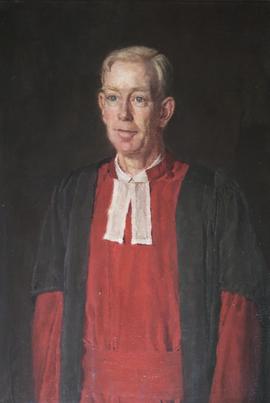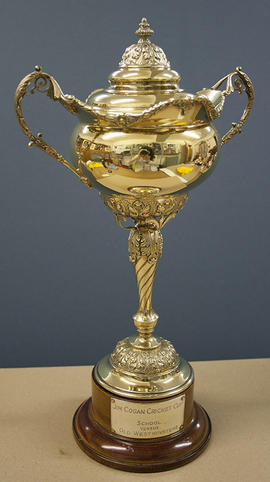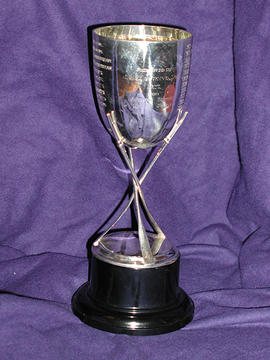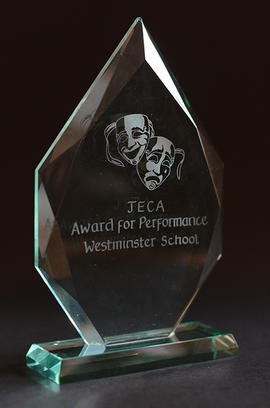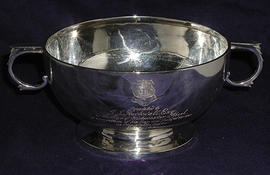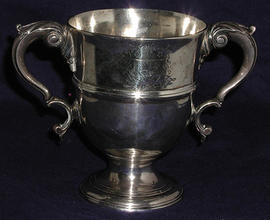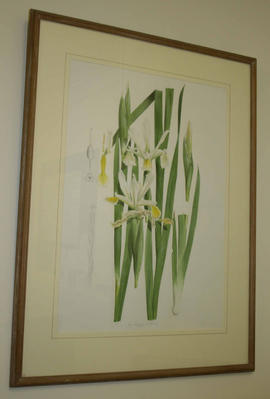Half length portrait of Christie standing, wearing a red cassock and a black gown; his head is turned slightly to his right.
Gwynne-Jones, Alan, 1892-1982Plinth, handles. Silver gilt.
The Alexander Clark Co LtdInscription: 'Presented by J.G. Jeffreys, Esq. 1923 for Junior Senior House Four'. Not loaded. No cover. Black plastic plinth. Donor: J.G. Jeffrey, 1923. Awarded: 1923-1974
William Hutton & Sons LtdWestminster Under School restarted in 1943 in Grant’s, when the Great School was evacuated. Joined the Great School in 1945, when it was back in London. [1:10] A day boy. Lived above Baker Street station. School still finding its feet being back in London. There were barrage balloons and anti-aircraft guns in Vincent Square. Rationing of food and clothing. [2:52] He entered via the 4th form, which no longer exists. [3:43] Weekly form orders, when the pupils were ordered according to their marks the previous week. A very competitive atmosphere. Moved up two years due to his academic promise. [4:29] Took the School Certificate at 14. [5:00] Maundy money prizes and book tokens. [6:06] Physical training in Little Dean’s Yard in the morning. [7:10] The war was very traumatic for him, as a Jew. He was excused going to religious services, although some other Jewish boys did go. Was allowed to be away from school for the major Jewish religious holidays. He was an atheist. [8:42] The Under School evacuated for 4 weeks when the flying bombs came to London. [10:22] School numbers were very low when he arrived. No more than 220 boys. [11:05] Greaze took place in the roofless School. [12:52] Memorable Masters. W. F. Monk, an inspiring teacher. Dr Burch, who had no control over his class at all. [14:55] No bullying, and corporal punishment was very rare. [17:03] Enjoyed rowing. [18:05] His mother and siblings were sent to America in June 1940 by his father, because they were Jewish. His father probably thought he was never going to see them again. [18:50] Father came to England in 1911. Landed at Tower Pier, penniless and not speaking the language. First job was in Petticoat Lane, selling fabric off a barrel. Ended up with a textile business. [20:36] Knew he was going into business but didn’t tell anyone at school. [21:46] Brother went to Westminster when it was evacuated, and had a totally different impression of the school. Felt that the Housemaster was a bully and an anti-Semite. Jeffrey felt no anti-Semitism at all when he was there. [22:27] Saw the first meeting of the committee that set up the United Nations, which took place in Church House in 1944. Boys felt they were at the centre of the world. [23:47] Went into his father’s business after school. Sold the business and retired at 57. [24:29] Was in Ashburnham House, but there wasn't much house spirit. Felt more a member of the school than his house.
Glass Award inscribed 'JECA Award for Performance Westminster School'. In black box.
Mappin & Webb LtdHow did you come to attend Westminster School (WS). Went to Francis Holland School (FHS) Sloane Square – an artsy school so not sufficient to study Physics and Chemistry A-Level. At Sixth Form girls often went to FHS Regents Park or St Paul’s Girls School. Relationship with WS for drama. Came on her own in 1967. [1,29] Brother was in Wrens 2 years below. Still studied maths at FHS. [1,44] First impressions. Much larger. Boys seemed very young, with 13 and 14 year olds in the class as they were scholarship. [3,00] Reaction of boys to have you in lessons. Good relationships with ones in class. College Hall - others who didn’t know her would show off, naïve. [3,46] separate table for Jewish boys. Sat with them to have intelligent conversation at lunch. [4,15] Treatment from masters. Good chemistry master. Some peculiar characters. [5,03] top set Physics, flamboyant teacher D. Hepburne-Scott. Keen on trains. Liked him at the time. [5,27] Old reports. Reveal he was quite damning of female capability, made disparaging misogynistic comments about her intellect and female domesticity. [6,56] Housemaster Mr Ross was embarrassed by this. [7,48] some positive comments, eventually acknowledged her potential, but still made allowances due to her sex. [8,58] academic standard. Teaching style was completely different. [9,46] whole a-level syllabus in 1 year. Exploring things that were interesting outside of the syllabus. Nuffield Chemistry. [10,43] teaching was eye opening. Responded to it well. [11,00] preparation of WS for university. Went into medicine. Accepted institutional sexism – 70 places for boys and 7 for girls. Gained confidence at WS, and got a scholarship at medical school. [12,13] joined the army after qualification. 350 medical officers, 9 women. Learnt to be gender-blind. [13,05] other characteristics gained from WS. Enjoying learning for the sake of education. Appreciated the leeway. [14,45] didn’t spend much time in school outside of lessons, as was only half at the school. Used 4 Barton Street sitting room and bathroom. Would spend half a day at each school. [15,35] time in St James’s Park in summer. Went home to Holland Park. Didn’t socialise much with the boys. [16,44] no facilities for girls. She was attached to Wren’s. Used staff toilet. School was experimenting with having female pupils, after she left, a couple of FHS girls arrived. Didn’t work financially to be under this setup. [18,00] fees at FHS were £90 per term. £150 per term at WS. Parents had to pay both schools. [18,53] would recommend it to girls at the time. Teaching is invaluable. Put into practice. Comfort being in an unusual situation, pushed the boundaries. [19,48] friendships with the boys. Didn’t last. Never invited to be an Old Westminster – institutional sexism. Didn’t feel fully part of the school. [21,01] met some who did medicine. Nearly all 3 years younger – started later as even though they’d got their qualifications they were too young. [22,38] difference between hers and her brother’s experience. Brother expelled for trying to set the school on fire and went to Marlborough. Similar friends. Didn’t compare experiences much. [23,41] no uniform at FHS Sixth Form, and none at WS. [24,26] WS customs. The Greaze. Unique slang to other schools. [25,19] difference to FHS atmospherically. Change in Sixth Form environment in itself at both schools. Only girl doing A-Level Maths at FHS. Good teaching, different as learning with people who were doing subjects they had chosen and had a passion for, as opposed to that they were forced to do. [26,42] assumption at WS that you were quick learners and would understand. Take things to a greater depth than required. Assuming interest. [27,46] Boys more politically engaged. Intellectual conversations at meals, but this was at FHS. [28,50] Didn’t show off their wealth, but also a lot of wealth at FHS. A level of class was assumed. Image proposed by the school changed in recent years. [30,49] pleased that WS accepted girls. Good for both sexes. For girls, especially in the 60s, beneficial to compete healthily in academics. [32,06] school reports. [33,36] impromptu trip in Physics to see the Flying Scotsman make its last ever scheduled run from King’s Cross. Went by tube, packed platform. More liberal teaching.
Inscription: 'Presented J. J. Huckwell by the boys of Westminster School in recognition of his long and faithful services as Assistant Master 1889-1921'. Not loaded. No cover. Handles.
Mappin & Webb LtdTwo handled silver cup with crest 'In patrium populum que.' Not loaded. No cover. Awarded 1880 - 1883. Names of pupils inscribed under the base. Makers Mark reads R.W.
